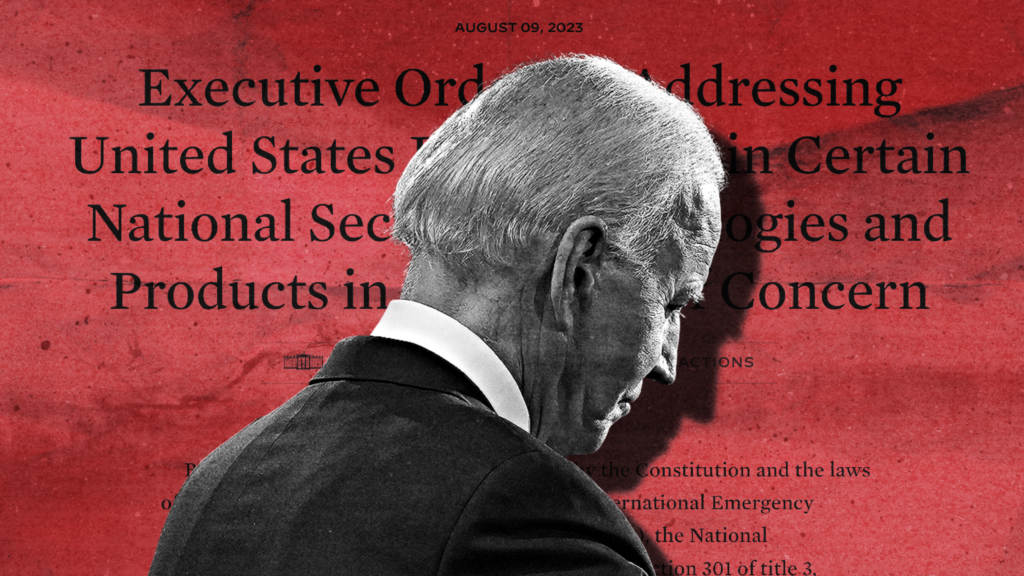by ROBBY STEPHANY SAUNDERS
The Biden administration recently issued an executive order intended to limit outbound U.S. investment in China. Given Beijing’s increased hostility to Taiwan, its growing friendship with Russian President Vladimir Putin and rapid progress in advanced technologies, there are obvious national security justifications for such an order.
However, the Biden executive order simply doesn’t go far enough — or in a timely enough manner — to address China’s rapid growth in advanced technologies that pose both civilian and military challenges for the United States. Because of this, it must be enhanced by more developed and robust congressional action — or further steps by the executive branch.
Essentially, the executive order requires U.S. investors to “provide notification of information relative to certain transactions involving covered foreign persons.” It also prohibits “engaging in certain other transactions involving covered foreign persons.”
This is rather nebulous, however, since it applies only to a limited scope of transactions and entities. In fact, the Biden administration included only three sectors in the executive order — semiconductors and microelectronics, quantum information technologies and artificial intelligence. These are certainly important, but other sectors matter in the national security realm, including large-capacity batteries, hypersonic vehicles, satellite-based communications, laser scanning systems with dual-use applications and space-related technologies.
These advanced industries matter to both the United States and China. But they’re a priority for Beijing, since there’s little separation between China’s civilian and military needs. As the executive order notes, Beijing is looking to use “cutting-edge technologies … for the purposes of achieving military dominance.”
And while it’s helpful to tackle China’s intelligence, surveillance and cyber-enabled capabilities, there’s also an urgent need to address Beijing’s growing dominance in commercial high-tech industries.
The executive order fails to establish a specific timeline for action. It does require reporting to Congress and the president within one year of the new regulations. But it doesn’t actually mandate a timeline for establishing them. And because it allows for certain technologies and products to be added or removed annually, it simply creates a murky landscape of conflicting subsections.
Complicating things is the fact that the executive order puts the Treasury Department in charge of scrutinizing transactions related to national security. While Treasury is the lead agency in charge of economic and finance policy, it lacks direct leadership over predominantly national security matters. There is a need for greater involvement by other departments and agencies more directly connected to intelligence gathering and the military.
Clearly, China poses a real threat. The executive order itself aims to limit “advancement by countries of concern” that pose “an unusual and extraordinary threat to the national security of the United States.” But despite outlining such a national emergency, it gives Treasury leeway to not actually prohibit swaths of these very activities.
To be truly effective, the executive order should explicitly cover all methods of trading for securities, private equity, venture capital and joint ventures in order to halt outbound capital that could benefit China’s civilian-military industries. Instead, its two-tiered system of notifications and prohibitions will likely result in unclear distinctions as to why certain criteria only require notification of a potential investment.
It would be far better if the executive order immediately started a timeline for restricting investments in semiconductors, quantum computing and artificial intelligence. But it simply doesn’t prohibit any investments in these technologies — or require U.S. firms doing business in China to disclose their investments to the federal government. Instead, it directs Treasury to consult with other agencies and issue regulations in the indefinite future.
As a result, the Biden executive order is more symbolic than effective. Prohibiting investment in China should be seen as an urgent step to protect U.S. economic and national security. Unfortunately, the administration has not mandated any immediate action, or even a deadline for action. So it fails to promptly address the risk that U.S. capital is continuing to help China modernize and advance its military and state-owned enterprises through investments in advanced technologies.
This poses unacceptable risks for America’s investors and U.S. national security. Washington must move quickly to widen its net — and block investments that could help to grow China’s nefarious capabilities.













